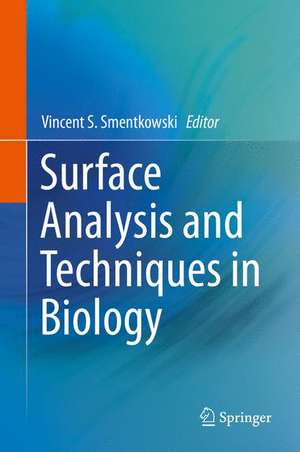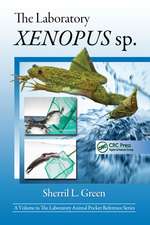Surface Analysis and Techniques in Biology
Editat de Vincent S. Smentkowskien Limba Engleză Hardback – apr 2014
The outer layer of bulk solid or liquid samples is referred to as the surface of the sample/material. At the surface, the composition, microstructure, phase, chemical bonding, electronic states, and/or texture is often different than that of the bulk material. The outer surface is where many material interactions/reactions take place. This is especially true biomaterials which may be fabricated into bio-devices and in turn implanted into tissues and organs. Surfaces of biomaterials (synthetic or modified natural materials) are of critical importance since the surface is typically the only part of the biomaterial/bio-device that comes in contact with the biological system.
Analytical techniques are required to characterize the surface of biomaterials and quantify their impact in real-world biological systems. Surface analysis of biological materials started in the 1960’s and the number of researchers working in this area have increased very rapidly since then, a number of advances have been made to standard surface analytical instrumentation, and a number of new instruments have been introduced.
| Toate formatele și edițiile | Preț | Express |
|---|---|---|
| Paperback (1) | 985.08 lei 38-45 zile | |
| Springer International Publishing – 2 sep 2016 | 985.08 lei 38-45 zile | |
| Hardback (1) | 1108.51 lei 6-8 săpt. | |
| Springer International Publishing – apr 2014 | 1108.51 lei 6-8 săpt. |
Preț: 1108.51 lei
Preț vechi: 1166.84 lei
-5% Nou
Puncte Express: 1663
Preț estimativ în valută:
212.11€ • 221.46$ • 175.55£
212.11€ • 221.46$ • 175.55£
Carte tipărită la comandă
Livrare economică 04-18 aprilie
Preluare comenzi: 021 569.72.76
Specificații
ISBN-13: 9783319013596
ISBN-10: 3319013599
Pagini: 350
Ilustrații: X, 326 p. 157 illus., 83 illus. in color.
Dimensiuni: 155 x 235 x 20 mm
Greutate: 0.77 kg
Ediția:2014
Editura: Springer International Publishing
Colecția Springer
Locul publicării:Cham, Switzerland
ISBN-10: 3319013599
Pagini: 350
Ilustrații: X, 326 p. 157 illus., 83 illus. in color.
Dimensiuni: 155 x 235 x 20 mm
Greutate: 0.77 kg
Ediția:2014
Editura: Springer International Publishing
Colecția Springer
Locul publicării:Cham, Switzerland
Public țintă
ResearchCuprins
Introduction.- Applications of XPS in Biology and Biointerface Analysis.- Biomolecular Analysis by Time-of-Flight Secondary Ion Mass Spectrometry (ToF-SIMS).- Cluster Secondary Ion Mass Spectrometry.- Biological Tissue Imaging at Different Levels: MALDI and SIMS Imaging Combined.- Molecular Structure and Identification Through G-SIMS and SMILES.- Imaging with the Helium Ion Microscope.- Sum Frequency Generation Vibrational Spectroscopy: A Sensitive Technique for the Study of Biological Molecules at Interfaces.- Near-Field Scanning Optical Microscopy: A New Tool for Exploring Biological Structure and Function in Biology.- Atomic Force Microscopy: Applications in the Field of Biology.- Multi-technique Characterization of DNA-modified Surfaces for Biosensing and Diagnostic Applications.
Notă biografică
Vincent S. Smentkowski is a Senior Scientist in the Nanostructures and Surfaces Laboratory at General Electric Global Research (GEGR) where he performs surface analysis to support research programs at GEGR, GE businesses, and strategic partners. Currently, his research is focused on the applications of ToF-SIMS analysis, emphasizing how multivariate statistical analysis tools facilitate data reduction. Vin holds 6 U.S. patents, more than 85 publications in referred journals, greater than 100 GEGR internal manuscripts, has co-authored 3 book chapters, and has presented numerous contributed and invited talks. Vin is a Fellow of the American Vacuum Society.
Textul de pe ultima copertă
The outer layer of bulk solid or liquid samples is referred to as the surface of the sample/material. At the surface, the composition, microstructure, phase, chemical bonding, electronic states, and/or texture is often different than that of the bulk material. The outer surface is where many material interactions/reactions take place. This is especially true biomaterials which may be fabricated into bio-devices and in turn implanted into tissues and organs. Surfaces of biomaterials (synthetic or modified natural materials) are of critical importance since the surface is typically the only part of the biomaterial/bio-device that comes in contact with the biological system.
Analytical techniques are required to characterize the surface of biomaterials and quantify their impact in real-world biological systems. Surface analysis of biological materials started in the 1960’s and the number of researchers working in this area have increased very rapidly since then, a number of advances have been made to standard surface analytical instrumentation, and a number of new instruments have been introduced. We felt the time was right for a book which summarized the main surface analysis techniques that are being used to study biological specimens/systems.
The compilation of chapters in this book will help the biological research community realize the benefits that surface analysis provides. We look forward to seeing a larger number of biologists and medical specialists using the techniques discussed in this book. It is of importance to note that new analysis instruments are continuously being developed and introduced to the scientific community – we look forward to seeing what the future has in store. We are also excited to see next generation medical devices, which will benefit from surface analysis, and which will help our society.
About the Editor
Vincent S. Smentkowski is a Senior Scientist in the Nanostructures and Surfaces Laboratory at General Electric Global Research (GEGR) where he performs surface analysis to support research programs at GEGR, GE businesses, and strategic partners. Currently, his research is focused on the applications of ToF-SIMS analysis, emphasizing how multivariate statistical analysis tools facilitate data reduction. Vin holds 6 U.S. patents, more than 85 publications in referred journals, greater than 100 GEGR internal manuscripts, has co-authored 3 book chapters, and has presented numerous contributed and invited talks. Vin is a Fellow of the American Vacuum Society.
Analytical techniques are required to characterize the surface of biomaterials and quantify their impact in real-world biological systems. Surface analysis of biological materials started in the 1960’s and the number of researchers working in this area have increased very rapidly since then, a number of advances have been made to standard surface analytical instrumentation, and a number of new instruments have been introduced. We felt the time was right for a book which summarized the main surface analysis techniques that are being used to study biological specimens/systems.
The compilation of chapters in this book will help the biological research community realize the benefits that surface analysis provides. We look forward to seeing a larger number of biologists and medical specialists using the techniques discussed in this book. It is of importance to note that new analysis instruments are continuously being developed and introduced to the scientific community – we look forward to seeing what the future has in store. We are also excited to see next generation medical devices, which will benefit from surface analysis, and which will help our society.
About the Editor
Vincent S. Smentkowski is a Senior Scientist in the Nanostructures and Surfaces Laboratory at General Electric Global Research (GEGR) where he performs surface analysis to support research programs at GEGR, GE businesses, and strategic partners. Currently, his research is focused on the applications of ToF-SIMS analysis, emphasizing how multivariate statistical analysis tools facilitate data reduction. Vin holds 6 U.S. patents, more than 85 publications in referred journals, greater than 100 GEGR internal manuscripts, has co-authored 3 book chapters, and has presented numerous contributed and invited talks. Vin is a Fellow of the American Vacuum Society.
Caracteristici
Highlights state-of-the-art surface analytical instrumentation, advanced data analysis tools, and the use of complimentary surface analytical instrumentation to perform a complete analysis of biological systems
Summarizes the main surface analysis techniques that are being used to study biological specimens/systems
Explores the benefits of surface analysis techniques to quantify their impact in real-world biological systems
Includes supplementary material: sn.pub/extras
Summarizes the main surface analysis techniques that are being used to study biological specimens/systems
Explores the benefits of surface analysis techniques to quantify their impact in real-world biological systems
Includes supplementary material: sn.pub/extras










